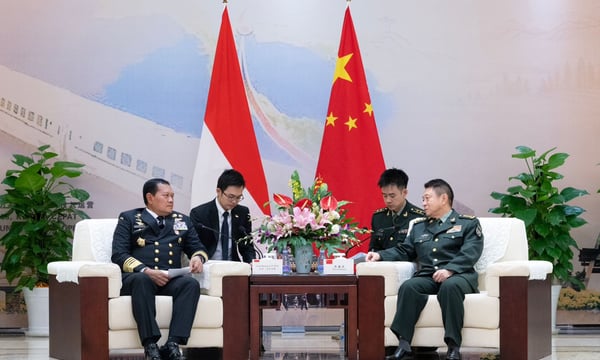In recent years, China’s defense diplomacy in Southeast Asia has intensified, signaling a calculated shift in regional strategy. While economic entanglement through the Belt and Road Initiative (BRI) has long been Beijing’s primary tool for regional influence, China’s increasingly visible military engagements with Southeast Asian states point to a deeper, more comprehensive strategic posture – it seeks to replace the United States’ role as a dominant security player in Southeast Asia.
China views Southeast Asia as its backyard, given the geographic proximity between the two regions. As it is already a dominant trade partner for Southeast Asia, China is puzzled that the region’s preferred security partner is the United States. Beijing thus seeks to replace the U.S. as a primary security partner for Southeast Asian states, and it has been actively pursuing that goal in recent years.
Beijing’s defense outreach to Southeast Asia is broad and multifaceted. It includes joint military exercises, arms sales, and high-level defense dialogues. China has conducted bilateral and multilateral exercises with Southeast Asian states, offered defense equipment and training to Laos and Myanmar, and conducted naval visits to Malaysia.
This year, China institutionalized defense dialogue mechanisms with Southeast Asian states. It expanded the traditional “2+2” defense and diplomacy dialogue mechanism with Vietnam into a “3+3” – to include public security matters. Beijing has also established 2+2 dialogue mechanisms with Indonesia and Cambodia.
Beijing often frames these interactions as win-win cooperation and part of its “Community of Shared Future” doctrine, emphasizing non-interference and mutual development. However, such overtures can be interpreted as a soft-power expansion designed to recalibrate the regional balance in its favor.
One of China’s most notable defense relationships in the region is with Cambodia. Since Cambodia-U.S. bilateral relations started to cool nearly 15 years ago over human rights issues, China has stepped in to become the primary security partner for Phnom Penh. Through military assistance and infrastructure support, including the controversial expansion of the Ream Naval Base, China has effectively secured a strategic foothold in the small Southeast Asian kingdom.
Thailand, traditionally a treaty ally of the U.S., has also drifted closer to China. Joint air force exercises such as Falcon Strike and frequent naval cooperation reflect a recalibration of Bangkok’s defense diplomacy. Furthermore, China has become the largest arm supplier for the Thai armed forces. Thailand maintains ties with both the United States and China, and therefore, its increasing openness to Chinese military hardware and engagement signals a hedging strategy – balancing between two powers in an increasingly multipolar Asia.
China’s defense ties with Indonesia, Malaysia, and the Philippines remain more cautious and transactional. These countries, all of which have maritime disputes with Beijing in the South China Sea, view defense cooperation through a more pragmatic lens. Indonesia, for instance, remains wary of Chinese incursions into its exclusive economic zone around the Natuna Islands.
Bilateral defense ties between China and Malaysia are warm, with the latter acquiring four Chinese warships in 2016. However, the Malaysians are building up their defense capabilities on Borneo to defend their maritime interests in the South China Sea, where they have overlapping claims with the Chinese.
The Philippines, under President Ferdinand Marcos Jr., has reversed his predecessor’s China-friendly approach, pivoting back toward the United States and actively contesting Chinese actions in the West Philippine Sea.
Beijing’s military engagement with Southeast Asia is not occurring in a vacuum – it is unfolding amid rising great power competition and against the backdrop of China’s growing assertiveness in regional disputes. While China speaks the language of peace and development, its parallel military build-up in the South China Sea, construction of artificial islands, and harassment of regional maritime activities suggest a dual strategy: charm on the surface, coercion when challenged.
In sum, China’s expanding defense cooperation with Southeast Asia reflects both an opportunity and a challenge for regional states. It offers the region new avenues for engagement and capacity-building, but also tests its resilience against a future where partnership may blur into pressure. How Southeast Asia navigates this duality will shape the region’s security architecture for years to come.






